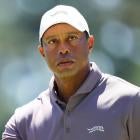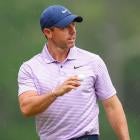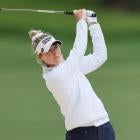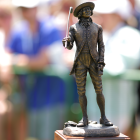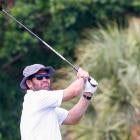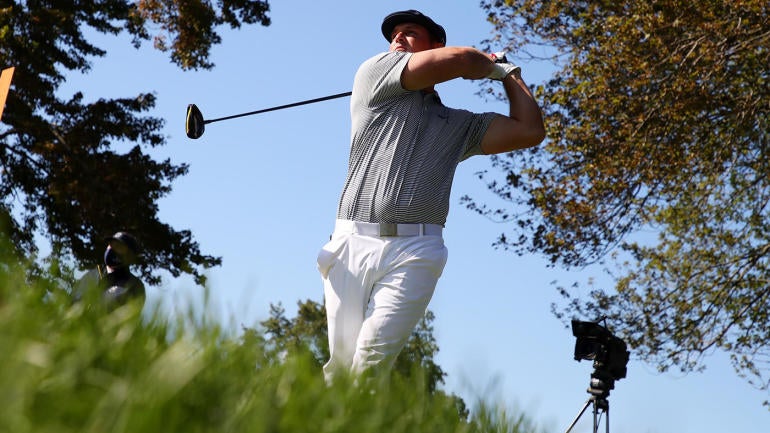
Bryson DeChambeau may not have broken golf, but by winning the 2020 U.S. Open at Winged Foot, he has reshaped the way it is interpreted. He shot a 67 in the final round on Sunday to touch off a 6-under 274, the only score under par for the week.
DeChambeau downed Matthew Wolff by six strokes in their mini-duel over the final three hours of the first major of the 2020-21 season.
World No. 1 Dustin Johnson finished T6 on the week and gained 2.8 strokes per round for the event. DeChambeau doubled it, and now we may never think about major championship golf the same way again.
Winged Foot -- one of the classics -- was supposed to stand up against what DeChambeau is trying to do. Some might call his style a mockery -- it's easy to reach that conclusion by watching him hit home runs or listening to him talk -- but the abridged version is that he's simply done the math on what it takes to win golf tournaments (even major championships) at a more brisk pace.
DeChambeau has worked his ass off to increase his swing speed and get the ball as close to the hole as is physically possible at the expense of pretty much everything else. He has, in many ways, leveraged the tools at his disposal to become a major champion.
"I think I'm definitely changing the way people think about the game," he said after his win on Sunday.
I was among those who thought his brawn would not play well on this golf course. It is Winged Foot, after all, one of the all-time tests this nation has to offer.
DeChambeau desecrated it all -- its angles, its nuance and its rough thicker than the Big Boy himself.
I thought this track would lead him down a path from which he could not recover. Instead, the opposite happened, and DeChambeau may have created an inflection point for the sport itself. He hit just 41% of fairways and -- maybe more importantly because of how narrow the fairways were -- that was not even really part of the game plan. He also averaged 325 yards off the tee, which definitely was part of the plan.
"[Hitting it as far as I did] was a tremendous advantage this week," he said. "I kept telling everybody it's an advantage to hit it farther. It's an advantage. [Statistician] Mark Broadie was talking to [coach] Chris Como, and they were both talking about how they just made the fairways too small this week to have it be an advantage for guys hitting the fairway.
"Let's take an example of you [making the fairway] like a yard wide. Nobody's got the fairway. Length's going to win. You make the fairways too wide, length's going to win. There's this balance between widths of fairways and where they want to play it and where they're going to try to make you play it."
The result of hitting it as far as possible is that DeChambeau has essentially eliminated one aspect of a game that's supposed to test the range of a golfer's ability. Instead of needing to drive it well, hit roped irons and maintain a great short game all while lag putting your brains out on roller-coaster greens, he's almost completely taken the long iron aspect out of the sport.
Again, this is to his credit. You still have to manage your way around with wedges, which DeChambeau did with astonishing accuracy and creativity all week. The Scientist showed that he could paint a little bit, too. You have to if you want to make two bogeys over your last 34 holes and shoot every round at par or better.
Want the sharpest DFS advice, picks and data-driven golf analysis? Listen below and subscribe to The First Cut Golf podcast where we explain what's happening on the course so you can win off of it.
In constructing this formula for winning golf tournaments, DeChambeau is leveraging the game for his own good. That a historic, 100-year-old renovated course got run over this week is no fault of his own.
While this will not work at every event or every major, it's going to work a lot in the near future with golf where it is at the moment. Think about how many times you saw DeChambeau with a 4- or 5-iron in his hands this week. On the 9th hole on Sunday, he hit his drive 375 yards on the 556-yard hole and flipped a short iron in before sinking the eagle.
It's almost impossible to add enough length to golf courses to take away DeChambeau's advantage of holding wedge into every green, and with his swing speed, even lengthy rough doesn't affect him. He is an ox dragging a plow through the dirt.
DeChambeau gets all the credit in the world not just for his long game but the work he did from 150 yards and in; it was immaculate all week. That was where I thought he would struggle, and he did not. Instead, he gained over 1 stroke per round in each of the major strokes-gained categories.
When DeChambeau showed up to the Charles Schwab Challenge in June following a three-month break on the PGA Tour amid the COVID-19 pandemic, he looked less like the linebacker he is purported to be and more like a middle-aged dad fighting Father Time by bench pressing his four kids intermittently throughout the day. It was easy to make fun of his plan -- hit it forever and worry about the rest later -- even more so when he released B-roll footage of himself working out longingly during quarantine in his home.
Following a top-five finish at the PGA Championship with this U.S. Open under his belt and two whacks at Augusta National on deck before the season is out, it's not so funny anymore.
"At the start of the year, he came out, and he was a bit bigger," said Rory McIlroy three months ago. "You could see he was getting a bit of speed and stuff, and he was hitting it a long way. But he hit a couple drives [at the Charles Schwab Challenge] that [caddie] Harry and I just looked at each other, and we're like, 'Holy shit. That was unbelievable.'
"I mean, it's impressive what he's doing. There's going to be courses where it works, and there's going to be courses where it won't."
This is where it's going to get interesting. If it works at Winged Foot, won't it work ... anywhere?
The USGA has popped DeChambeau numerous times in the past for the advantages he's tried to gain. From his side-saddle putting to his use of a compass in competition, the relationship between the USGA and its newest champion has not always been the most cordial.
With a lingering distance report forthcoming in future months from the USGA and R&A, will what DeChambeau accomplished at Winged Foot be a tipping point for some sort of change to the game to reestablish the nuances of classic courses that have hosted major championship golf in the past?
"I'm not going to stop," said DeChambeau. "Next week, I'm going to be trying a 48-inch driver. We're going to be messing with some head designs and do some amazing with things with Cobra to make it feasible to hit these drives maybe 360, 370, maybe even farther. I don't know.
"There's a lot of young guns that are unbelievable players, and I think the next generation that's coming up into golf hopefully will see this and go, 'Hey, I can do that too.'"
There are a lot of problems with the top of championship golf right now, but most of them stem from a conversation about equipment. It's no secret that an inability to rein in the ball has affected style and setup at the highest level of professional golf. This week was the apex of that, and now, you have to wonder what DeChambeau will do at Augusta National in November.
To be clear, this is not a Bryson DeChambeau problem, it's a Golf (big G) problem.
What greater credit could be given to somebody within their profession than the very success they're achieving may engender change within that industry?
That's how good DeChambeau has been this year, and that's how good he was all week at Winged Foot. That may be perceived as a slight, but the reality is that it's ultimately a compliment.
DeChambeau has told us over the years that he wants to leave his mark on the game. It fomented a social media crowd hungry for content, but he's actually beginning to look prophetic. From one-length irons to mega-distance to future generations emulating him instead of somebody else, he wants to be at the forefront of it all. Remember, we're talking about somebody who once compared himself to George Washington and Albert Einstein.
The irony here is that the man who fancies himself a bioengineer is affecting the landscape by sheer force. What DeChambeau did at Winged Foot this week will reverberate both because of its immense historical achievement and because there's now something to point to and say, "Is this what we want golf to be?"
Bryson DeChambeau is changing golf as he sees fit. Only it might not be in ways he ever imagined.














